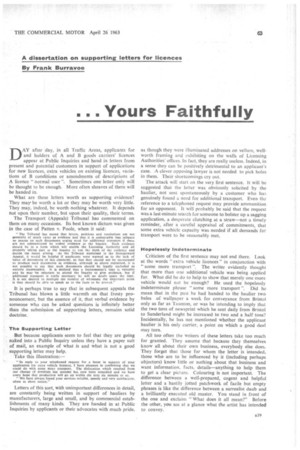•• Yours Faithfully
Page 65

If you've noticed an error in this article please click here to report it so we can fix it.
DAY after day, in all Traffic Areas, applicants for and holders of A and B goods carriers' licences appear at Public Inquiries and hand in letters from present and potential customers in support of applications for new licences, extra vehicles on existing licences, variations of B conditions or amendments of descriptions of A licence "normal user ". Sometimes one letter only will be thought to be enough. More often sheaves of them will be handed in,
What are these letters worth as supporting evidence? They may be worth a lot or they may be worth very little. They may, indeed, be worthnothing whatever. It depends not upon their number, but upon their quality, their terms.
The Transport (Appeals) Tribunal has commented on them on many occasions. Its best known dictum was given in the case of Patten v. Poole, when it said: It is perhaps true to say that in subsequent appeals the Tribunal has blown a little warmth on that frosty pronouncement, but the essence of it, that verbal evidence by someone who can be asked questions is infinitely better than the submission of supporting letters, remains solid doctrine.
The Supporting Letter
But because applicants seem to feel that they are going naked into a Public Inquiry unless they have a paper suit of mail, an example of what is and what is not a good supporting letter may help.
Take this illustration:— Letters of this sort, with unimportant differences in detail, are constantly being written in support of hauliers by manufacturers, large and small, and by commercial establishments of many kinds. They are handed in at Public Inquiries by applicants or their advocates with much pride, as though they were illuminated addresses on vellum, wellworth framing and exhibiting on the walls of Licensing Authorities' offices. In fact, they are really useless. Indeed, in a sense they can be positively detrimental to an applicant's case. A clever opposing lawyer is not needed to pick holes in them. Their shortcomings cry out.
The attack will start on the very first sentence. It will be suggested that the letter was obviously solicited by the haulier, not sent spontaneously by a customer who has genuinely found a need for additional transport. Even the reference to a telephoned request may provide ammunition for an opponent. It will probably be said that the request was a last-minute search for someone to bolster up a sagging application, a desperate clutching at a straw—not a timely reminder, after a careful appraisal of commitments, that some extra vehicle capacity was needed if all demands for transport were to be reasonably met.
Hopelessly Indeterminate
Criticism of the first sentence may not end there. Look at the words "extra vehicle licences" in conjunction with "some more transport ". The writer evidently thought that more than one additional vehicle was being applied for. What did he do to help to show that merely one more vehicle would not be enough? He used the hopelessly indeterminate phrase "some more transport ". Did he mean that in the past he had handed to the haulier two bales of wallpaper a week for conveyance from Bristol only as far as Taunton, or was he intending to imply that the two tons of newsprint which he sent daily from Bristol to Sunderland might be increased to two and a half tons? Incidentally, he has not mentioned whether the applicant haulier is his only carrier, a point on which a good deal may turn.
All too often the writers of these letters take too much for granted. They assume that because they themselves know all about their own business, everybody else does. They forget that those for whom the letter is intended, those who are to be influenced by it (including perhaps objectors) know little or nothing about that business and want information, facts, details—anything tohelp them to get a clear picture. Colouring is not important. The difference between a well-prepared, cogent and helpful letter and a hastily jotted patchwork of facile but empty phrases is like the difference between a surrealist daub and a brilliantly executed old master. You stand in front of the one and exclaim "What does it all mean?" Before the other, you see at a glance what the artist has intended to convey.












































































































